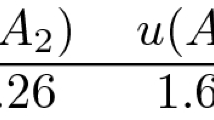Abstract
In this paper, a problem for utility theory - that it would have an agent who was compelled to play “Russian Roulette’ with one revolver or another, to pay as much to have a six-shooter with four bullets relieved of one bullet before playing with it, as he would be willing to pay to have a six-shooter with two bullets emptied - is reviewed. A less demanding Bayesian theory is described, that would have an agent maximize expected values of possible total consequence of his actions. And utility theory is located within that theory as valid for agents who satisfy certain formal conditions, that is, for agents who are, in terms of that more general theory, indifferent to certain dimensions of ‘risk’. Raiffa- and Savage-style arguments for its more general validity are then resisted. Addenda are concerned with implications for game theory, and relations between ‘utilities’ and ‘values’.
Similar content being viewed by others
References
Bouyssou, Denis and Vansnick, Jean-Claude: 1988, ‘A note on the relationship between utility and value functions’, Risk, Decision and Rationality (ed. B. Munier), Dordrecht. (Revision of a paper presented at FUR-III, Aix-en-Provence, June, 1986.)
Ellsberg, Daniel: 1954, ‘Classic and current notions of “Mathematical Utility”’, Economic Journal, 64, pp. 528–56.
Fishburn, Peter: 1970, Utility Theory for Decision Making, New York.
Fishburn, Peter: 1981, ‘Subjective expected utility: A review of normative theories’, Theory and Decision, 13, pp. 139–99.
Fishburn, Peter: 1988, ‘Expected utility: An anniversary and a new era’, Journal of Risk and Uncertainty, 1, pp. 267–83.
Gauthier, David: 1986, Morals by Agreement, Oxford.
Hammond, Peter J.: 1988, ‘Consequentialist foundations for expected utility’, Theory and Decision, 25, pp. 25–78.
Jarrow, Robert: 1987, ‘An integrated axiomatic approach to the existence of ordinal and cardinal utility functions’, Theory and Decision, 22, pp. 99–110.
Jeffrey, Richard C.: 1974, ‘Frameworks for preference’, Essays on Economic Behavior under Uncertainty (ed. Michael Balch, et al.), New York.
Jeffrey, Richard C.: 1982, ‘The sure thing principle’, PSA 1982, Volume 2.
Jeffrey, Richard C.: 1987: ‘Risk and human rationality’, The Monist, 70, pp. 223–36.
Jeffrey, Richard C.: 1988, ‘Biting the Bayesian bullet: Zeckhauser's problem’, Theory and Decision, 25, pp. 117–22.
Kahneman, David and Tversky, Amos: 1979, ‘Prospect theory: An analysis of decision under risk’, Econometrica, 47, pp. 263–91.
Krantz, David, Luce, R. Duncan, Suppes, Patrick, and Tversky, Amos: 1971, Foundations of Measurement, Volume 1, Additive and polynomial representations’, New York.
Luce, R. Duncan and Raiffa, Howard: 1957, Games and Decisions: Introduction and Critical Survey, London.
McClennen, Edward F.: 1983, ‘Sure-thing doubts’, Foundations of Utility and Risk Theory with Applications, Dordrecht.
Raiffa, Howard: 1968, Decision Analysis: Introductory Lectures on Choice under Uncertainty, Reading, Massachusetts.
Roth, Alvin E.: 1979, Axiomatic Models of Bargaining, Berlin.
Savage, Leonard J.: 1972, The Foundations of Statistics (Second Revised Edition), New York (first edition, 1954).
Sobel, Jordan Howard: 1978, ‘Probability, chance and choice: A theory of rational agency’, Circulated working paper, 1978.
Sobel, Jordan Howard: 1983, ‘Expected utilities and rational actions and choices’, Theoria, 40, pp. 159–83.
Sobel, Jordan Howard: 1985, ‘Circumstances and dominance in causal decision theory’, Synthese, 63, pp. 167–202.
Sobel, Jordan Howard: 1986, ‘Notes on decision theory: Old wine in new bottles’, Australasian Journal of Philosophy, 64, pp. 407–37.
Sobel, Jordan Howard: 1987, ‘Self-doubts and Dutch strategies’, Australasian Journal of Philosophy, 65, pp. 56–81.
Sobel, Jordan Howard: 1987, ‘On the evidence of testimony for miracles: A Bayesian interpretation of David Hume's analysis’, The Philosophical Quarterly, 37, pp. 166–86.
Sobel, Jordan Howard: 1988, ‘World Bayesianism: Comments on the Hammond/ McClennen debate’, Risk, Decision and Rationality (ed. B. Munier), Dordrecht.
Sobel, Jordan Howard: 1989, ‘Partition-theorems for causal decision theories’, Philosophy of Science, 56, pp. 71–93.
Sobel, Jordan Howard: Forthcoming-a, ‘Machina and Raiffa on the independence axiom’, Philosophical Studies.
Sobel, Jordan Howard: Forthcoming-b, ‘Maximization, stability of decision, and actions in accordance with reason’, Philosophy of Science.
Weirich, Paul: 1986, ‘Expected utility and risk’, British Journal for the Philosophy of Science, 37, pp. 419–42.
Author information
Authors and Affiliations
Rights and permissions
About this article
Cite this article
Sobel, J.H. Utility theory and the Bayesian paradigm. Theor Decis 26, 263–293 (1989). https://doi.org/10.1007/BF00134109
Issue Date:
DOI: https://doi.org/10.1007/BF00134109




